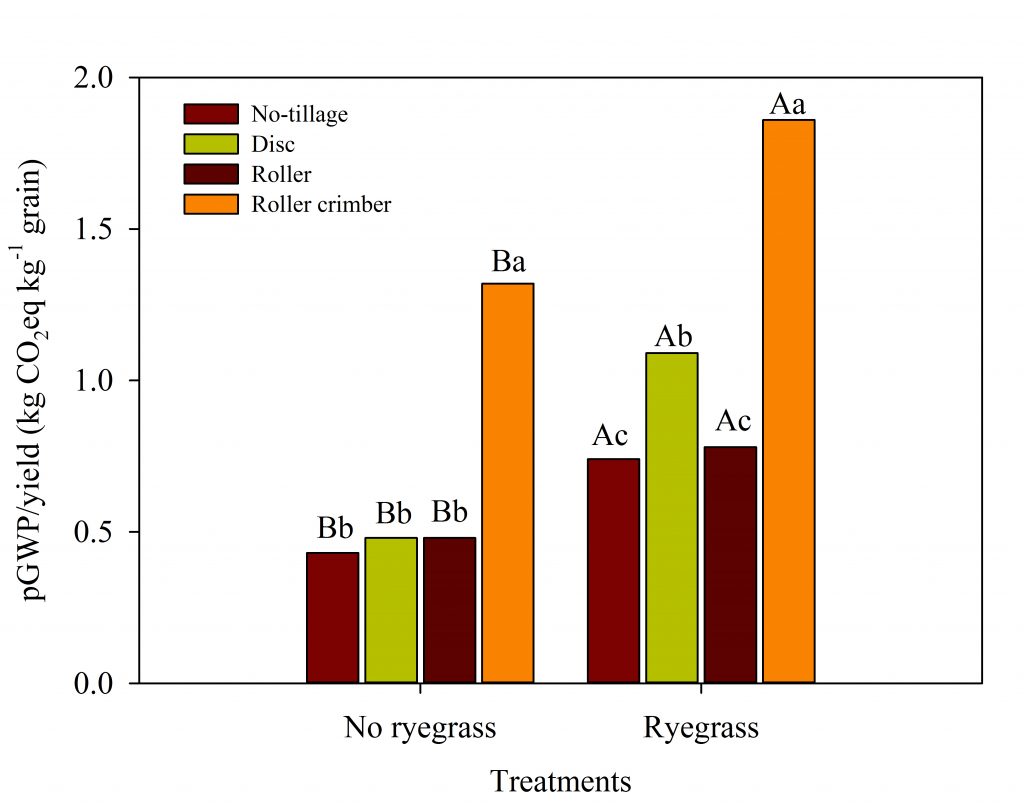Straw management effects on global warming potential and yield-scaled greenhouse gas emissions in a subtropical rice ecosystem
23/maio/2023
ABSTRACT Global warming potential (GWP) of rice paddies depends on straw management. This study evaluated methane (CH4) and nitrous oxide (N2O) emissions and soil C stocks to determine GWP and yield-scaled GWP under different strategies and intensities of rice straw management in a subtropical climate. We hypothesized that decreasing soil management intensity and straw incorporation in the soil would reduce GWP. Methane fluxes were substantially higher during the rice growing season than in the off-season, while the opposite was observed […]
Mitigation of greenhouse gases emission affected by no-tillage and winter cover crops in a subtropical paddy rice ecosystem
06/abr/2023
ABSTRACT Paddy rice production based on traditional soil management emits large amounts of methane (CH4) into the atmosphere. This study assessed the potential of no-tillage (NT) and winter cover crops (WCC) to mitigate net greenhouse gas (GHG) emissions in a subtropical paddy rice ecosystem. A long-term (20-yrs) experiment was evaluated regarding the effect of NT combined with winter fallow or three WCC (ryegrass, white oat, and birdsfoot trefoil) on seasonal CH4 -C and nitrous oxide (N2O-N) emissions and on soil […]
Greenhouse gas emissions during rice crop year affected by management of rice straw and ryegrass
03/ago/2020
ABSTRACT One of the challenges in rice areas is the sustainable post-harvest system, which involves using rice straw management and cover crop species. In this context, this study aimed to evaluate the emission of methane (CH4) and nitrous oxide (N2O) with the use of different post-harvest management of rice straw as well as with the combined use of ryegrass. A field experiment was conducted during the 2016 off-season and 2016/17 rice crop season with different post-harvest rice straw management: maintaining […]
Soil CH4 and N2O Emissions from Rice Paddy Fields in Southern Brazil as Affected by Crop Management Levels: a Three-Year Field Study
20/abr/2018
ABSTRACT Rice yield increases in response to improvements in crop management, but the impact on greenhouse gas (GHG) emissions in the subtropical region of Southern Brazil remains unknown. A three-year field study was developed aiming to evaluate the impact that an increase in crop management levels (high and very high) has on soil methane (CH4) and nitrous oxide (N2O) emissions, as compared to the level (medium) currently adopted by farmers in Southern Brazil. Differences in crop management included seed and […]
Emissão de gases do efeito estufa em diferentes usos da terra no bioma Cerrado
01/fev/2011
A conversão de áreas nativas com o corte e queima de vegetação seguida do cultivo do solo resultam em mudanças na dinâmica da matéria orgânica do solo, com alterações nas emissões dos gases causadores de efeito estufa (GEE: CO2, CH4 e N2O) da biosfera para a atmosfera, que causam a elevação da temperatura média e, consequentemente, as mudanças climáticas globais. O objetivo deste estudo foi verificar as relações entre os fluxos de CO2, CH4 e N2O com a umidade, biomassa […]
Fluxos de CO2, CH4 e N2O de um Argissolo tratado com lodo de esgoto e cultivado com mamona
01/dez/2009
A aplicação de resíduos orgânicos no solo pode alterar a emissão de gases para atmosfera e dentre estes, CO2, CH4 e N2O, podem contribuir para o aumento do efeito estufa. Este ensaio foi realizado com o objetivo de quantificar a emissão de gases do efeito estufa (GEE) de um Argissolo Vermelho-Amarelo distrófico (PVAd) tratado com lodo de esgoto (LE) e cultivado com mamoneira em área de reforma de canavial. Os tratamentos testados foram: Controle sem N; FertMin = fertilizante mineral; […]

